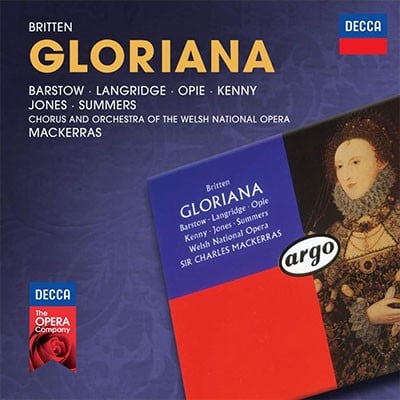Libretto by William Plomer after Lytton Strachey's 'Elizabeth and Essex' (E,G)
Major roles: 2S,M,T,3Bar,B;
minor roles: S,M,2T,Bar,2B,mimes; chorus; ballet
3(II,III=picc).2.corA.2.bcl.2.dbn-4.3.3.1-timp.perc(4):glsp/t.bells/
gong/SD/TD/BD/cyms/whip/wdbl/tamb/tgl-harp-cel-strings
stage band: historical instruments
Abbreviations (PDF)
Boosey & Hawkes
‘Dedicated by gracious permission to Her Majesty Queen Elizabeth II’, Gloriana was completed in 1953 and first performed as part of that year’s Coronation celebrations. The unjust critical furore surrounding the premiere has now passed into history and the work can be seen as a worthy successor to Billy Budd with which it shares a number of important features. However, the opera is unusual for Britten in that the three acts are generally made up of self-contained set-pieces, rather than the continuous narrative he normally prefers. Although there are scenes of ceremony and pageantry (as befits the occasion for which it was written), the work’s dramatic core is the unfolding relationship between Elizabeth I and the Earl of Essex, the Queen torn between her private affection for the Earl and her sense of public duty when he is found guilty of treason and condemned to death.
The sound-world of the opera has an appropriately ‘Elizabethan’ atmosphere, the famous ‘Choral’ and ‘Courtly Dances’ evoking a period flavour without ever lapsing into pastiche. The opera has had a chequered history, but it now seems as though Gloriana has finally taken its rightful place in Britten’s operatic oeuvre.
Reproduced by kind permission of the Britten-Pears Library

Josephine Barstow/Philip Langridge/Della Jones/Jonathan Summers/Alan Opie/Yvonne Kenny/Richard Van Allan/Bryn Terfel/Janice Watson/Willard White/John Shirley-Quirk/John Mark Ainsley/Peter Hoare/Welsh National Opera and Chorus/Charles Mackerras
Decca Argo 4402132

